Search the Special Collections and Archives Portal
Search Results
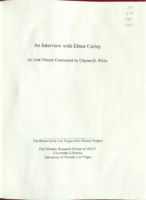
Transcript of interivew with Elmer Curley by Claytee D. White, November 1, 2011
Date
Archival Collection
Description
Text
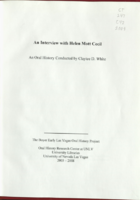
Transcript of interview with Helen M. Cecil by Claytee D. White, April 24, 2007
Date
Archival Collection
Description
Text
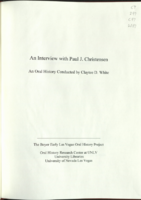
Transcript of interview with Paul J. Christensen by Claytee D. White, February 19, 2008
Date
Archival Collection
Description
Text

Transcript of interview with D. Taylor by Claytee White, July 25, 2014
Date
Archival Collection
Description
D. Taylor knew from the time he graduated Georgetown University he wanted to make his career in the labor movement. He credits his Virginia-born mother as an early mentor; she was at once “nice,” “tough,” “genteel,” and “liberal,” and she instilled these values in her son. As a new college grad, Taylor headed west to Lake Tahoe, where he was hired in 1981 by the Culinary Union to organize workers and oversee an eleven-and-a-half-month strike. Culinary then sent him to organize Las Vegas in 1984, a few years after Ronald Reagan crushed the 1981 Professional Air Traffic Controllers Organization strike and only months after the Amalgamated Transit Union strike against Greyhound went down in defeat. In this interview, Taylor recalls that in 1984, most Las Vegas casinos were no longer owned by individuals and families but by multinational corporations that refused to negotiate improved health insurance coverage for their workers. Taylor led a citywide strike that ultimately cost the union six casinos and about eight thousand members. In 1987, Culinary sent him back to Las Vegas, where he has remained. He tells the history of the union in Las Vegas and its leadership, especially crediting Al Bramlet in the 1970s for recruiting a diverse workforce and promoting casino hiring through the union. In 1987 Taylor changed the union rep structure to give a larger voice to Las Vegas’s racially diverse workforce and began recruiting potential leaders of color (like Hattie Canty)—thus, he followed Bramlet’s lead but pushed it further to create a truly bottom-up organization. The husband and father is especially proud of the various programs Culinary Workers Union Local 226 has implemented to improve the lives of Las Vegas union workers and their families but sees widening gaps in the city between those who have great wealth and those who do not. To Taylor, his work is “always about the members. They endure so much. They sacrifice so much.”
Text
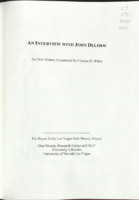
Transcript of interview with John J. Delibos by Claytee D. White, October 2, 2012
Date
Archival Collection
Description
Text
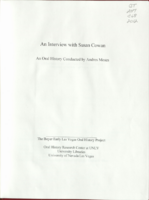
Transcript of interview with Susan Cowan by Andres Moses, January 31, 2006
Date
Archival Collection
Description
Text
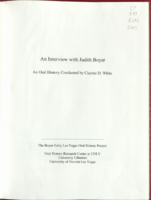
Transcript of interview with Judith Boyer by Claytee D. White, November 8, 2005
Date
Archival Collection
Description
Text
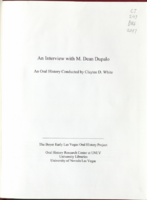
Transcript of interview with Martin Dean Dupalo by Claytee D. White, October 24, 2005
Date
Archival Collection
Description
Text
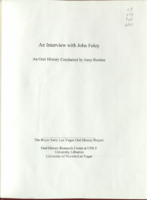
Transcript of interview with John Foley by Irene Rostine, May 11, 2011
Date
Archival Collection
Description
Text
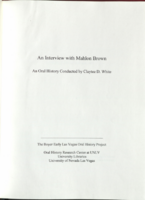
Transcript of interview with Mahlon Brown by Claytee D. White, December 16, 2003
Date
Archival Collection
Description
Text
